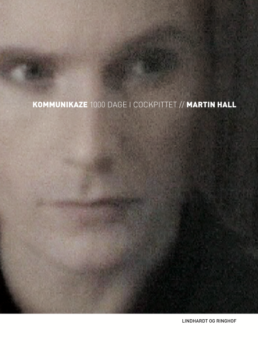KOMMUNIKAZE
MARTIN HALL
DIARY
MARCH 2001
LINDHARDT OG RINGHOF (ISBN 87-595-1661-5)
Kommunikaze is a diary written by Martin Hall between January 1998 and December 2000 and is a set of writings that follows him through thick and thin for a period of three years.
As reader you’ll witness his immense work load and personal crisis during the period, the recordings of several albums and his ongoing literary work. You also gain insight into his collaborations with Danish directors such as Ole Bornedal (director of the Hollywood film The Night Watch) and Flemming Enevold (director of Camille).
Depicitions of journeys to Berlin, Stockholm and London alternate with film and video recordings, and stories from international exhibitions with bizarre tv and radio appearances. Not surprisingly, the speed of life ends up taking its toll on Hall.
Genre: Diary
Pages: 301
Design: Kenneth Schultz
Photo: Casper Sejersen
"This is a symptom above intellectual vanity ... that's how my literary debut The Reconstruction Is Greater from 1983 opened, and I might as well have started these new journals with the same set of words."
”Martin Hall writes stylishly. And funny. And incredibly sharp.”
Berlingske Tidende (the Danish equivalent to The Times)
”Exquisitely sarcastic and aristocratically stylish proclamations about all and everything.”
Weekendavisen (the Danish equivalent to The Observer)
“Touching because it reveals the cracks in Hall’s rock hard ego manicure.”
Information (the Danish equivalent to The Independent)
“An effective cementation of the myth about Martin Hall.”
Politiken (the Danish equivalent to The Guardian)
“Pearls of refreshing intellectual arrogance.”
Jyllands-Posten (Denmark’s biggest daily newspaper)
”Martin Hall – who at one and the same time appears both highly modern and almost altmodisch – remains delightful company.”
Euroman (the Danish equivalent to to GQ Magazine)
The most harsh part of the book has to be Martin Hall’s comments on the Danish music industry and Copenhagen’s literary circles. However, his criticism of these establishments is always balanced by a sobering process of self-reflection and he never spares himself along the way.
At the other end of the spectrum you’ll find small examples of Hall’s indifference to the passing fame and glory of all things – such as an incident where his new gold record award for the Boel & Hall album ends up in a supermarket plastic bag and gets lost.

